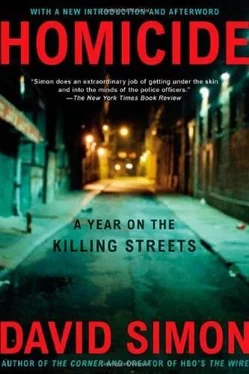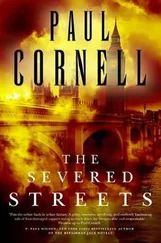“Jimmy, she was run over on that lot.”
“I didn’t do that.”
“Jimmy, you ran her down.”
“I’d been drinking. I can’t remember.”
Later, in a second interview, Jimmy Shrout admits to remembering that he hit a slight bump as he drove off the gravel lot. He tells the detectives that he thought he’d hit a curb or something.
“Jimmy, there’s no curb on that lot.”
“I don’t remember,” the kid insists.
Brown is especially curious about one particular detail: “Later on, did you ever find a single sandal anywhere in your car?”
“A sandal?”
“Like a woman’s summer thong.”
“Yeah, a few weeks later. I came across something like that. I thought it was my girlfried’s and I threw it out.”
In the end, it will be nothing better than manslaughter by auto, which is nothing better than two or three years of state time, tops. The problem with homicide by auto is the same as homicide by arson: Without witnesses, no jury can be made to believe that someone killed that way isn’t the victim of an accident.
Both Worden and Brown understand that, but Sprout’s story will make it clear to them what actually happened in that parking lot. It wasn’t Shrout who wanted to go home, it was Carol Wright. She wanted to go and Shrout was upset. After all, she’d driven across Baltimore with him, she’d smoked his shit, and now she wasn’t going for anything. They argued and she got angry or maybe scared; either way, Brown and Worden cannot imagine that Carol Wright left that car of her own volition and walked across that gravel lot with only one shoe. No question about it: She left that car in a hurry.
All that waits in the future, but today, at the moment that Dave Brown notices the bad dye job in Jimmy Lee Sprout’s ident photo, the case is solved, and it’s solved as a murder, not an accidental death by auto, not a case pended by the medical examiner. Dave Brown has every reason to be satisfied: Regardless of what any prosecutor or jury wants to say about it later, today the death of Carol Wright is going down as a crime. Black hair, blond eyebrows, case closed.
Another case closes as well. A few hours after Brown shows him the ident photo, telling him to check the hair color, Worden watches Brown pack up his desk and walk to the coffee room coat rack.
“Sergeant,” says Brown to McLarney, who sits across the aisle from Worden, “unless you need me for anything, I’m going to start my holiday.”
“No, go ahead, Dave,” agrees McLarney.
“Donald,” says Brown, acknowledging the older detective, “have a good one.”
“You too, David,” answers Worden. “Merry Christmas to you and yours.”
Brown stops in his tracks. David? Not Brown? And merry Christmas? Not “Season’s greetings, you piece of shit”? Or even “Happy holidays, you worthless fuck”?
“That’s it?” Brown asks, turning back to Worden. “‘Merry Christmas, David’? You’re not going to give me shit? Last month I walked out of here and it was ‘Happy Thanksgiving, you piece of shit.’”
“Merry Christmas, David,” says Worden again.
Brown shakes his head and McLarney begins to laugh.
“You want me to call you a piece of shit,” says Worden, “I’ll call you a piece of shit.”
“No, hey. I’m just confused.”
“Oh, you’re confused,” says Worden, now smiling. “In that case, give me a quarter.”
“You’re always giving him quarters,” says McLarney. “Why is Worden always taking quarters from you?”
Dave Brown shrugs.
“You don’t know?” asks Worden.
“I have no fucking idea,” says Brown, fishing out a coin and tossing it to the older detective. “He’s Donald Worden. If he wants a quarter, I give him a quarter.”
Worden smiles strangely at this particular gap in Dave Brown’s education.
“Well,” asks Brown, looking at Worden, “is there a reason?”
Still smiling, Worden holds Brown’s latest contribution between thumb and forefinger, his arm extended upward so that the coin catches a little shine from the fluorescent lights.
“Twenty-five cents,” says Worden.
“Yeah. So?”
“How long have I been a poh-leece?” asks Worden, giving it the full Hampden drawl.
And at last Dave Brown understands. Twenty-five cents, twenty-five years. Worden’s small, symbolic affirmation.
“Pretty soon,” says Worden, smiling, “I’m gonna have to ask for a nickel too.”
Brown smiles as the logic settles in his mind. He’s learned something he never even wondered about, the answer to a question he never thought to ask. Worden wants a quarter, you give him a quarter. He’s the Big Man, for Chrissakes, the last natural police detective in America.
“Here, Brown,” offers Worden, tossing the quarter back to the younger detective. “Merry Christmas to you.”
Brown stands in the center of the coffee room, holding the quarter in his right hand, his face creased by confusion.
“You need a quarter, Donald, take it,” he says, throwing the coin back.
Worden catches it and tosses it back in one fluid motion. “I don’t want your money. Not today.”
“You can have it.”
“David,” Worden says, tiring, “keep your fucking quarter. A merry Christmas to you and yours and I’ll see you after the holidays.”
Brown looks at Worden oddly, as if the entire contents of his mind had suddenly been rearranged like furniture. He hesitates in the doorway, waiting for God knows what.
“What’re you hanging around for?” asks Worden.
“Nothing,” Brown answers finally. “Merry Christmas, Donald.”
He leaves as a free man, debts canceled and dues paid.
FRIDAY, DECEMBER 23
Tom Pellegrini sits like Ahab himself at the corner of the colonel’s sixth-floor conference table, staring hard at the white whale of his own making.
Across the table is, in his opinion, Latonya Wallace’s murderer, but the Fish Man doesn’t look like a child-killer; he never has, really. The aging store owner is an everyman for West Baltimore, his dull, dark jacket, baggy trousers and work boots a statement of quiet surrender understood by any working man. Less typical is the smoking pipe he carries in a jacket pocket, an item that never made much sense to Pellegrini. For a Whitelock Street denizen, it seemed something of an affectation, a small island of rebellion speckling this sea of human conformity. On several occasions over the past year, Pellegrini had been tempted to grab the stinking, smoldering thing and send it soaring.
Today, he has done as much.
Amid so many greater issues to be decided, it is a small point, but to Pellegrini even the small points matter now. The Fish Man likes his pipe, and for that reason alone he cannot have it. During previous interrogations, the store owner had, at critical moments, drawn on his pipe as if it were its own answer, and Pellegrini had come to associate the smell of the Fish Man’s weed with the man’s unflappable calm and indifference. And so, when the Fish Man reaches for his pouch not five minutes after taking his seat at the table, Pellegrini tells him to put the pipe away.
This time, everything has to be different. This time, the old store owner has to be made to believe that he is truly beaten, that they know his darkest secret even before he reveals it. He has to be made to forget about those other trips downtown; he has to be denied the comfort of that history, and to the extent that the pipe was part of that history, he has to be denied that as well.
And other things, Pellegrini tells himself, will be different. The man sitting on the other side of the table, across from the Fish Man, is proof enough of that.
During the months of preparation for this final confrontation, the idea of interrogation as a clinical science has become a religion for Pellegrini, and the firm of Interrotec Associates Inc., in particular, a priestly class. Pellegrini has digested the firm’s written material as well as its history of successful interviews in a variety of military and government security probes as well as criminal investigations. The company was good; the police departments who had worked with its interrogators said as much when he called them for references. The officers of the firm described themselves as “interrogational specialists, consultants and publishers dedicated to the research, development and enhancement of the art of interview.” A mouthful, to be sure, but Pellegrini argued that in the Latonya Wallace case, as in no other, the quality and precision of this last interrogation was paramount.
Читать дальше












